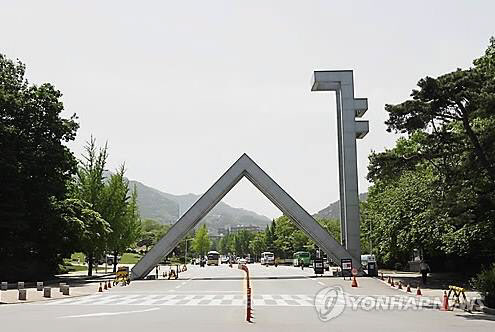Seoul National University, one of Korea‘s leading universities, needs to spur efforts to further internationalize if it wants to rise in global rankings, the SNU board of trustees said Monday.
On Monday, a team of 12 SNU researchers headed by professor Ye Sung-joon of the Graduate School of Convergence Science and Technology, submitted a project report that analyzed the number of joint international research initiatives conducted by SNU and its implications in global university rankings.
On Monday, a team of 12 SNU researchers headed by professor Ye Sung-joon of the Graduate School of Convergence Science and Technology, submitted a project report that analyzed the number of joint international research initiatives conducted by SNU and its implications in global university rankings.

The SNU research team blamed the institute‘s comparatively low level of global cooperation as the main issue behind the low citation rate of theses written by SNU scholars.
“In the top 10 percent of globally cited theses, SNU’s remained among the lowest ranks,” the team said, pointing out that universities with more joint international collaborations generally received more citations.
It stressed SNU’s need to improve on certain markers of internationalization, “The university needs to take measures to proactively respond to global issues by expanding the number of foreign faculty members and students with growth potential.”
The team’s research was done by compiling and studying dissertations published between 2010 and 2014 on “Scopus,” a global database for reference articles.
According to the researchers, articles published by SNU in collaboration with overseas universities showed a consistent climb, from 1,848 in the year 2010 to 2,341 in 2014. In those five years, a total of 10,899 articles were published under joint efforts with foreign universities.
Albeit laudable, however, SNU came in seventh on the list of eight institutions selected by the team as the world‘s best research-centered schools.
University of Toronto took the crown, churning out 32,508 theses, nearly triple that of SNU’s in the same period. Oxford University came in second with 28,119 theses, followed by Stanford University’s 20,102 theses.
For percentage of joint international theses as a part of total number of theses published, SNU marked 26.4 percent, coming in last. Oxford University was first in the same measure at 53.2 percent, University of Toronto second with 45.5 percent and Australia’s University of Melbourne third with 43.2 percent.
When compared to other top Asian schools such as University of Singapore, University of Tokyo, University of Beijing and University of Hong Kong, SNU still lagged behind.
It marked second to last in the accumulated number of joint international research among eight Asian universities, and third to last in the percentile of international theses to the total published articles.
Its number of foreign full-time professors as of 2015 remained 4.96 percent, far behind the 10 percent of the universities of Tokyo and Kyoto and 20 percent of the universities of Hong Kong and Singapore.
By Lim Jeong-yeo (kaylalim@heraldcorp.com)
“In the top 10 percent of globally cited theses, SNU’s remained among the lowest ranks,” the team said, pointing out that universities with more joint international collaborations generally received more citations.
It stressed SNU’s need to improve on certain markers of internationalization, “The university needs to take measures to proactively respond to global issues by expanding the number of foreign faculty members and students with growth potential.”
The team’s research was done by compiling and studying dissertations published between 2010 and 2014 on “Scopus,” a global database for reference articles.
According to the researchers, articles published by SNU in collaboration with overseas universities showed a consistent climb, from 1,848 in the year 2010 to 2,341 in 2014. In those five years, a total of 10,899 articles were published under joint efforts with foreign universities.
Albeit laudable, however, SNU came in seventh on the list of eight institutions selected by the team as the world‘s best research-centered schools.
University of Toronto took the crown, churning out 32,508 theses, nearly triple that of SNU’s in the same period. Oxford University came in second with 28,119 theses, followed by Stanford University’s 20,102 theses.
For percentage of joint international theses as a part of total number of theses published, SNU marked 26.4 percent, coming in last. Oxford University was first in the same measure at 53.2 percent, University of Toronto second with 45.5 percent and Australia’s University of Melbourne third with 43.2 percent.
When compared to other top Asian schools such as University of Singapore, University of Tokyo, University of Beijing and University of Hong Kong, SNU still lagged behind.
It marked second to last in the accumulated number of joint international research among eight Asian universities, and third to last in the percentile of international theses to the total published articles.
Its number of foreign full-time professors as of 2015 remained 4.96 percent, far behind the 10 percent of the universities of Tokyo and Kyoto and 20 percent of the universities of Hong Kong and Singapore.
By Lim Jeong-yeo (kaylalim@heraldcorp.com)







![[KH Explains] How should Korea adjust its trade defenses against Chinese EVs?](http://res.heraldm.com/phpwas/restmb_idxmake.php?idx=644&simg=/content/image/2024/04/15/20240415050562_0.jpg&u=20240415144419)










![[Today’s K-pop] Stray Kids to return soon: report](http://res.heraldm.com/phpwas/restmb_idxmake.php?idx=642&simg=/content/image/2024/04/16/20240416050713_0.jpg&u=)